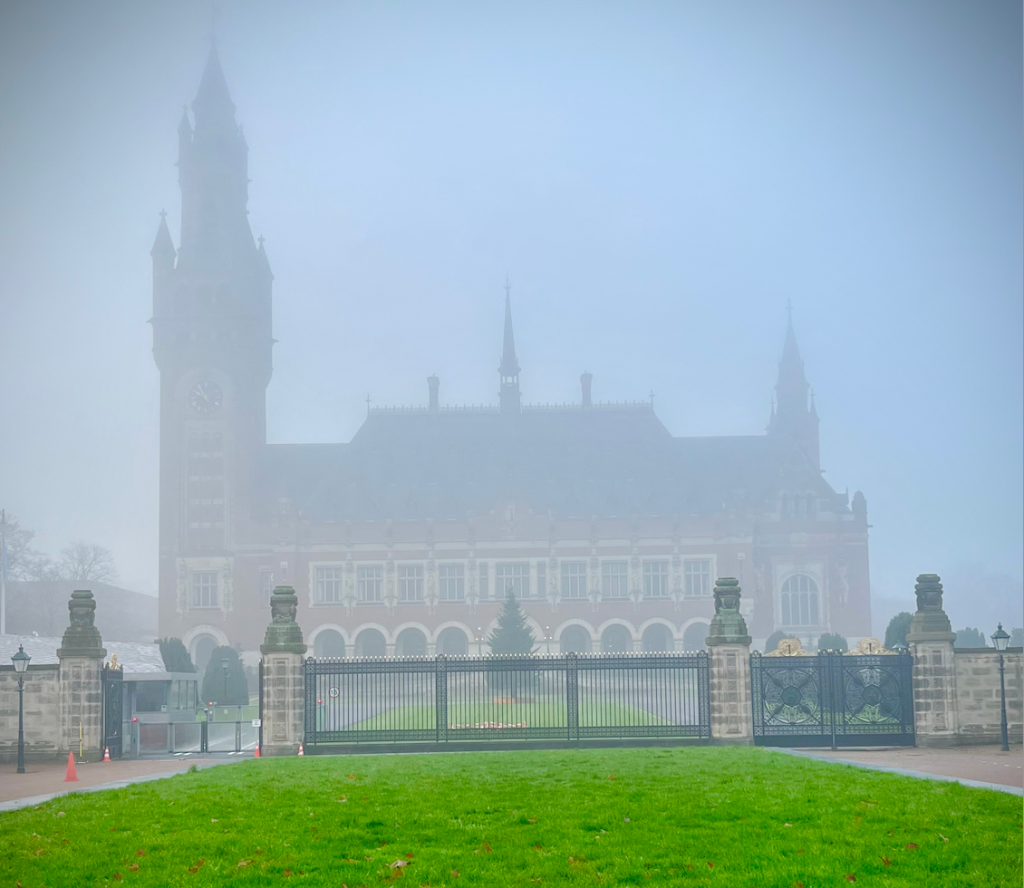The following article was written by Amanda Ghahremani and Mark Kersten and originally appeared in the Toronto Star. Amanda is an international lawyer, research fellow at the Human Rights Center, UC Berkeley, and at the Simone de Beauvoir Institute, Concordia University. Mark is the founder of Justice in Conflict, and an assistant professor of criminology and criminal justice at the University of the Fraser Valley.

South Africa has accused Israel of committing genocide in Gaza. The world is listening. As advocates of international law, we are profoundly disappointed by the recent discourse in Canadian media, which has distorted what is at stake here: not politics, nor history, but human life.
Last month, South Africa instituted proceedings at the International Court of Justice (ICJ) over allegations that Israel is committing a genocide in Gaza. The ICJ is an impartial and independent international court that adjudicates disputes between states. Canada has often been involved in cases before the court. It is currently supporting The Gambia’s case against Myanmar for genocide against the Rohingya people and has brought Syria to the ICJ over alleged breaches of the Convention Against Torture.
Some critics have suggested that South Africa is disqualified from bringing a case to the ICJ in relation to Gaza, because its previous government refused to surrender former President of Sudan, Omar al-Bashir, to the International Criminal Court (ICC) to face charges of genocide. This argument is nonsensical.
It is, of course, deplorable that South Africa refused to surrender al-Bashir to the ICC in 2015. But if there was a rule barring states that have failed to meet their obligations under international law from bringing cases to the ICJ, then no state would ever have standing before the court. We need look no further than Canada. This country has admitted that it has committed genocide against Indigenous peoples. Rightly, no one suggests that this disqualifies Canada from bringing Syria to the ICJ over state-sponsored torture. Similarly, should Israel be barred from participating in ICJ cases because it offered to sell Apartheid South Africa nuclear weapons? Of course not.
Critics have also implied that Israel’s claim of self-defense against the horrific October 7 attacks absolves it from committing genocide in Gaza. Again, this is wrong.
Genocide should never be condoned under any circumstances. There are limits to a state’s conduct, even in self-defense, and there are rules around necessity, distinction, and proportionality under international law that apply. This is precisely why it is perplexing to us that critics are condemning South Africa for bringing a case to an international court, where such issues can be properly adjudicated.
Israel is free to make the argument that it is acting in self-defense; the ICJ may take that into consideration as it hears the case. The ICJ offers a forum to examine the facts and to make a legal ruling about them. International law can only be strengthened when states use its institutions; when they emphasize law, not war. The ICJ is not meant to serve either side of the dispute. It is meant to serve the international laws and norms that protect civilians from atrocities.
Among those advocating against the ICJ case are former Justice Minister Irwin Cotler and former justice of the Supreme Court of Canada, Rosalie Abella, who rationalised that “history will judge Israel.” We worry that this advocates a ‘kill first, ask questions later’ approach. With over 10,000 children killed in Gaza and ten children losing limbs per day since the military operations began, waiting for history to judge when there are courts available for this exact purpose is a death sentence for too many.
Civilian victims of international crimes cannot afford to wait for “history”. That is why the ICJ’s ability to issue provisional measures, which could include ordering Israel to end military operations in Gaza, allow the passage of food and aid, and end the expulsions of civilians from the Gaza Strip, is so critical as we reach the 100-day mark of the violence. These measures can save lives. History cannot.
Finally, it is wrong to say that Israel is immune from charges of genocide simply because its people were previously targeted with the crime. Victims can also be perpetrators. Preventing and stopping genocide, wherever it occurs, is how we can collectively respect victims of genocide across the world. Otherwise, “never again” is a hollow call.
Everyone interested in this case should read South Africa’s filing and follow the proceedings at the ICJ. The facts presented by South Africa – based on evidence from the United Nations, international human rights organizations, and public statements by Israeli officials inciting atrocities against Palestinian civilians – cannot be wished away because they are inconvenient.
Reasonable people can disagree whether the legal threshold for genocide is met in this case. It is ultimately for the ICJ to decide; not on a whim or because of political interference, but based on the legal facts put before its judges.


Agree! The International Court of Justice should step in to ensure justice and protect lives in #Gaza. #LawOverHistory
Pingback: المشهد الحقوقي لفلسطين 21- 27 /1 / 2024 - فيجن للدراسات الاستراتيجية